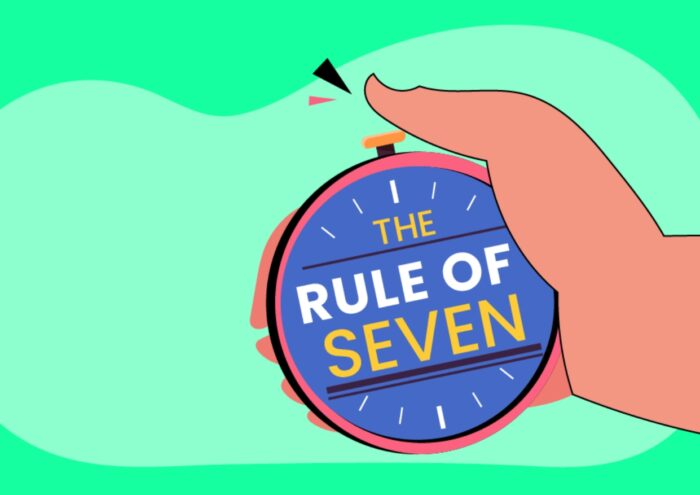
Repeating the same message, in slightly different forms, in many different channels may seem like an exercise in vanity or redundancy. But the truth is that repetition is one of your most valuable tools in marketing and advertising. What is it that makes repetition so valuable? And what steps should your organization take to practice repetition effectively?

The Rule of Seven
In marketing, the “rule of seven” is a commonly followed adage that it takes seven impressions of a message to make a real imprint. You’ve likely experienced this for yourself, even if you weren’t actively counting the number of repetitions you encountered. The first time you saw a commercial on TV, you might not have even noticed it. The second time you saw it, it might have looked vaguely familiar. By the fourth or fifth repetition, you could probably repeat most of the dialogue in the commercial by heart. By the final repetition, it was probably stuck in your head.
Some people may find this level of repetition slightly annoying, but there’s no arguing that it works. If the message is visible, familiar, and memorable, it’s much more likely to be persuasive.

Rationale for Repetition
Why does this work?
There are several reasons.
- The mere exposure effect. The mere exposure effect is a psychological phenomenon in which people gradually become more familiar with things that are repeated to them, and gradually come to like or dislike them much more strongly. This applies to nearly everything, including advertisements as well as locations, people, and activities. If you see your neighbor and make small talk with them every day, you’ll eventually start to become familiar with them and like them, even if they’re not the type of person you’d usually be friends with. Similarly, seeing an advertisement over and over again is going to breed at least some familiarity and appreciation, even if that’s mixed in with a bit of annoyance.
- Memory. Repeating things also makes them more memorable. When you were studying for exams in school, you didn’t simply read the textbook and assume that you could remember every last word. Instead, you highlighted the most important facts and drilled them over and over, using flashcards or other techniques to repeat your exposure. Repeat something often enough, and it will become unforgettable.
- Familiarity. We tend to warm up to people (and brands) as we become more familiar with them. Repeating the exact same message multiple times fosters some familiarity, but it’s even more effective to repeat distinct, yet similar messages across multiple channels. It’s a way of introducing people to the brand overall, rather than narrowing their focus to only one message or takeaway.
- Trust and credibility. For better or worse, humans often suffer from the illusory truth effect. This cognitive bias makes us increasingly likely to believe something to be the truth if we’re repeatedly exposed to it, regardless of the actual truth. Even something outlandishly and absurdly false can eventually become seen as truth if repeated often enough. Obviously, you shouldn’t exploit this to spread misinformation, but it is worth noting that sufficient repetition can make your brand more believable and be seen as more trustworthy.
- Overcoming resistance. Sometimes, repetition helps overcome resistance. If people mistrust your brand or if they’re skeptical of the benefits of your product, gentle and persistent repetition may eventually cause them to reassess these feelings.
- Minimal cost and effort. Repetition is also a viable strategy because it’s cost effective. For example, if you’ve already made the effort of building an email list, it costs almost nothing to send a new email message to that list.

Capturing the Value of Repetition
These are some strategies that can help you capture the full value of repetition in marketing:
- Avoid excessive verbatim repetition. Repetition is good, but only to a point. If you repeat the exact same words in the exact same way too many times, it’s going to get annoying. Be wary of your phrasing, frequency, and timing.
- Create omnichannel experiences. Your repetition will be even more powerful if it flows across multiple channels simultaneously. Use many channels and mediums to increase the power of your messaging.
- Use process flows and drip campaigns. Create high-level diagrams of drip campaigns and messaging flows for your leads, prospects, and customers. It will help you stay organized as you coordinate messaging at the conceptual level.
- Automate what you can. Automate whatever you can to minimize internal friction, accelerate deployment, and improve overall marketing efficiency. It’s also a way to ensure consistency – and adherence to your high-level vision.
- Gather feedback at every step. Get as much feedback as you can, and at every step of the process. If your message isn’t leaving people with the right impression, repeating it can actually do more harm than good. And if people find your repetition too annoying, you’re not going to see the benefits. Only objective, reliable feedback will help you achieve the best possible outcomes.

Say it with me: repetition in marketing is a good thing. Repetition in marketing is a good thing! It doesn’t have to be this obnoxious, and probably shouldn’t be, but strategically using repetition across your marketing channels can make your brand more familiar, more memorable, and more trustworthy. It’s a secret weapon that can give you an edge over the competition.











